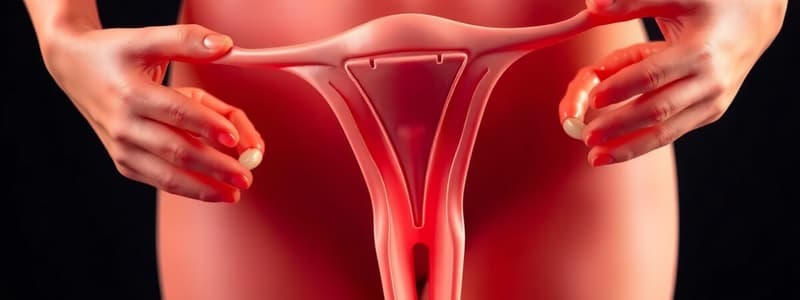Podcast
Questions and Answers
What is a primary hormonal imbalance observed in women with Polycystic Ovary Syndrome (PCOS)?
What is a primary hormonal imbalance observed in women with Polycystic Ovary Syndrome (PCOS)?
- Hyperandrogenism (correct)
- Increased levels of follicle-stimulating hormone (FSH)
- Elevated estrogen levels
- Decreased luteinizing hormone (LH)
How does insulin resistance contribute to the symptoms of PCOS?
How does insulin resistance contribute to the symptoms of PCOS?
- It decreases androgen production.
- It improves follicular maturation.
- It results in lower LH levels.
- It leads to hyperinsulinemia, increasing androgen levels. (correct)
What is a common clinical manifestation of anovulation in women with PCOS?
What is a common clinical manifestation of anovulation in women with PCOS?
- Increased likelihood of early menopause
- Infertility and irregular menstrual cycles (correct)
- Frequent regular menstrual cycles
- Consistent ovulatory patterns
Which of the following contributes to the increased risk of endometrial cancer in women with PCOS?
Which of the following contributes to the increased risk of endometrial cancer in women with PCOS?
What effect does chronic low-grade inflammation have in PCOS?
What effect does chronic low-grade inflammation have in PCOS?
What is a potential consequence of the imbalance of gonadotropins in PCOS?
What is a potential consequence of the imbalance of gonadotropins in PCOS?
Which of the following best describes the characteristic appearance of polycystic ovaries?
Which of the following best describes the characteristic appearance of polycystic ovaries?
What is a major contributing factor to obesity in women with PCOS?
What is a major contributing factor to obesity in women with PCOS?
Flashcards
What is PCOS?
What is PCOS?
Polycystic Ovary Syndrome (PCOS) is a hormonal disorder that mainly affects women of reproductive age, causing imbalances in hormones and metabolism, leading to various symptoms.
What is hyperandrogenism in PCOS?
What is hyperandrogenism in PCOS?
Hyperandrogenism is a key feature of PCOS, where the ovaries and adrenal glands produce too much testosterone and other male hormones, disrupting normal follicle development and causing symptoms like excess hair and acne.
How does hyperandrogenism affect ovulation in PCOS?
How does hyperandrogenism affect ovulation in PCOS?
Hyperandrogenism disrupts follicular development in PCOS, leading to anovulation (lack of ovulation). It also causes imbalances in LH and FSH, worsening androgen production and preventing proper follicle maturation. This leads to numerous immature follicles in the ovaries.
What is insulin resistance in PCOS?
What is insulin resistance in PCOS?
Signup and view all the flashcards
How does insulin resistance contribute to PCOS symptoms?
How does insulin resistance contribute to PCOS symptoms?
Signup and view all the flashcards
What is the role of inflammation in PCOS?
What is the role of inflammation in PCOS?
Signup and view all the flashcards
How are ovaries affected in PCOS?
How are ovaries affected in PCOS?
Signup and view all the flashcards
What are the complications of PCOS?
What are the complications of PCOS?
Signup and view all the flashcards
Study Notes
Polycystic Ovary Syndrome (PCOS)
- PCOS is a complex endocrine disorder affecting women of reproductive age.
- Characterized by hormonal imbalances and metabolic disturbances.
- A key feature is hyperandrogenism, excessive androgen production by ovaries and adrenal glands.
- This leads to disrupted follicular development, anovulation (lack of ovulation), hirsutism (excessive hair growth), acne, and androgenic alopecia (hair loss).
- Imbalances in luteinizing hormone (LH) and follicle-stimulating hormone (FSH) worsen androgen production, preventing proper follicular maturation.
- Multiple immature ovarian follicles are a result.
Insulin Resistance in PCOS
- Insulin resistance is a hallmark of PCOS.
- Body cells become less responsive to insulin.
- To compensate, the pancreas produces more insulin (hyperinsulinemia).
- Hyperinsulinemia increases androgen production in ovaries.
- It also reduces sex hormone-binding globulin (SHBG) levels, increasing free testosterone.
- Insulin resistance contributes to obesity, higher risk of metabolic syndrome and type 2 diabetes.
Inflammation and Ovarian Dysfunction
- PCOS is associated with chronic low-grade inflammation.
- Elevated inflammatory markers (e.g., C-reactive protein, interleukin-6) worsen insulin resistance and increase cardiovascular risk.
- Ovarian dysfunction in PCOS results in polycystic ovaries, filled with many small antral follicles.
- These follicles fail to develop into dominant follicles capable of ovulation.
- This disruption causes infertility and irregular menstrual cycles (oligomenorrhea or amenorrhea).
- Prolonged exposure of the endometrium to unopposed estrogen increases endometrial hyperplasia and cancer risk.
- Irregular or heavy menstrual bleeding are common.
Hypothalamic-Pituitary-Ovarian (HPO) Axis Dysregulation
- Dysregulation of the HPO axis is central to PCOS.
- Promotes excessive LH secretion, inhibiting appropriate FSH stimulation.
- In some cases, altered adrenal function contributes to hyperandrogenism.
- Chronic low-grade inflammation and neuroendocrine dysregulation sustain metabolic and reproductive irregularities.
- These factors increase long-term risks like cardiovascular disease, type 2 diabetes, and endometrial problems.
- Understanding the interlinked pathways is crucial for management and treatment.
Studying That Suits You
Use AI to generate personalized quizzes and flashcards to suit your learning preferences.




